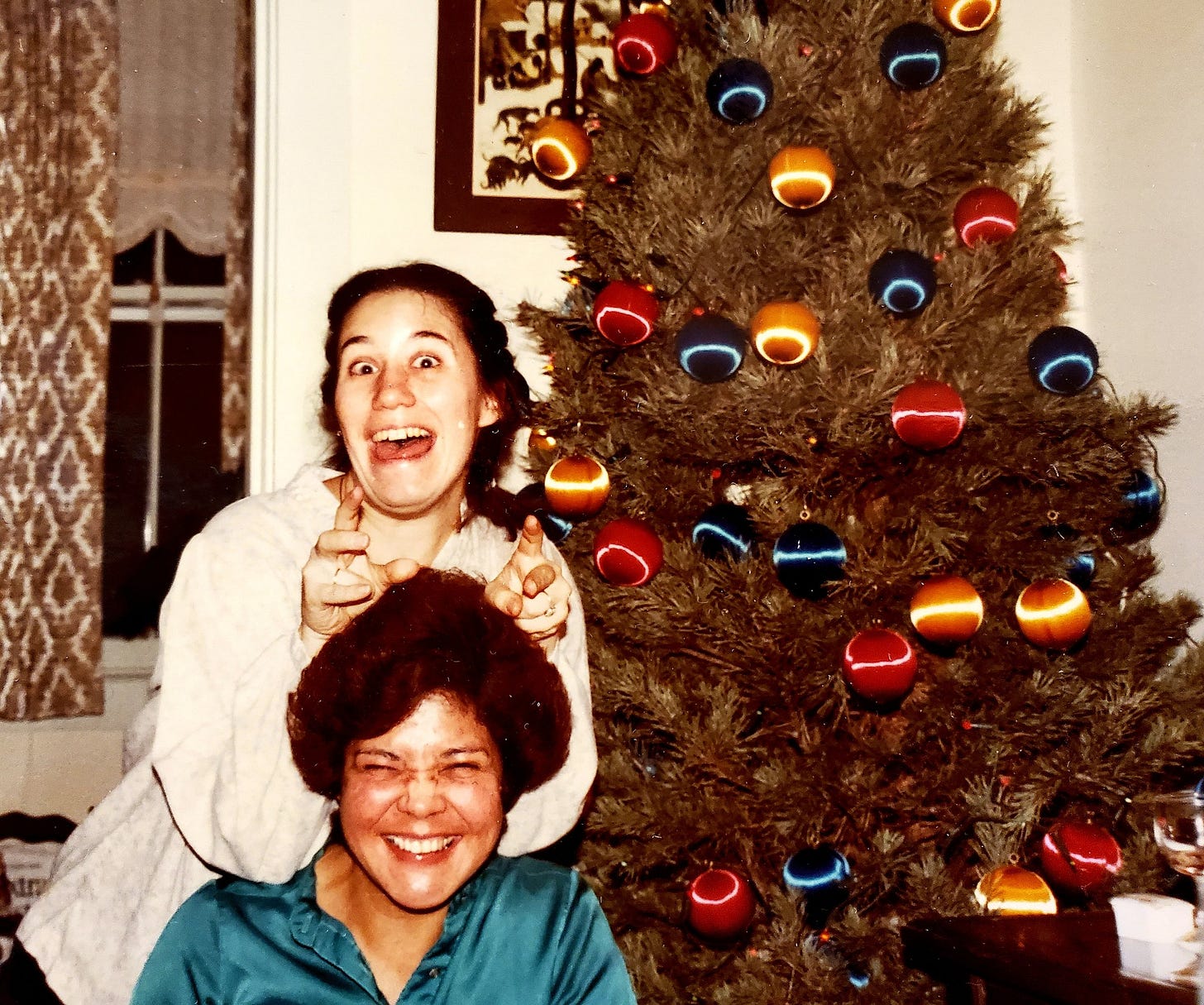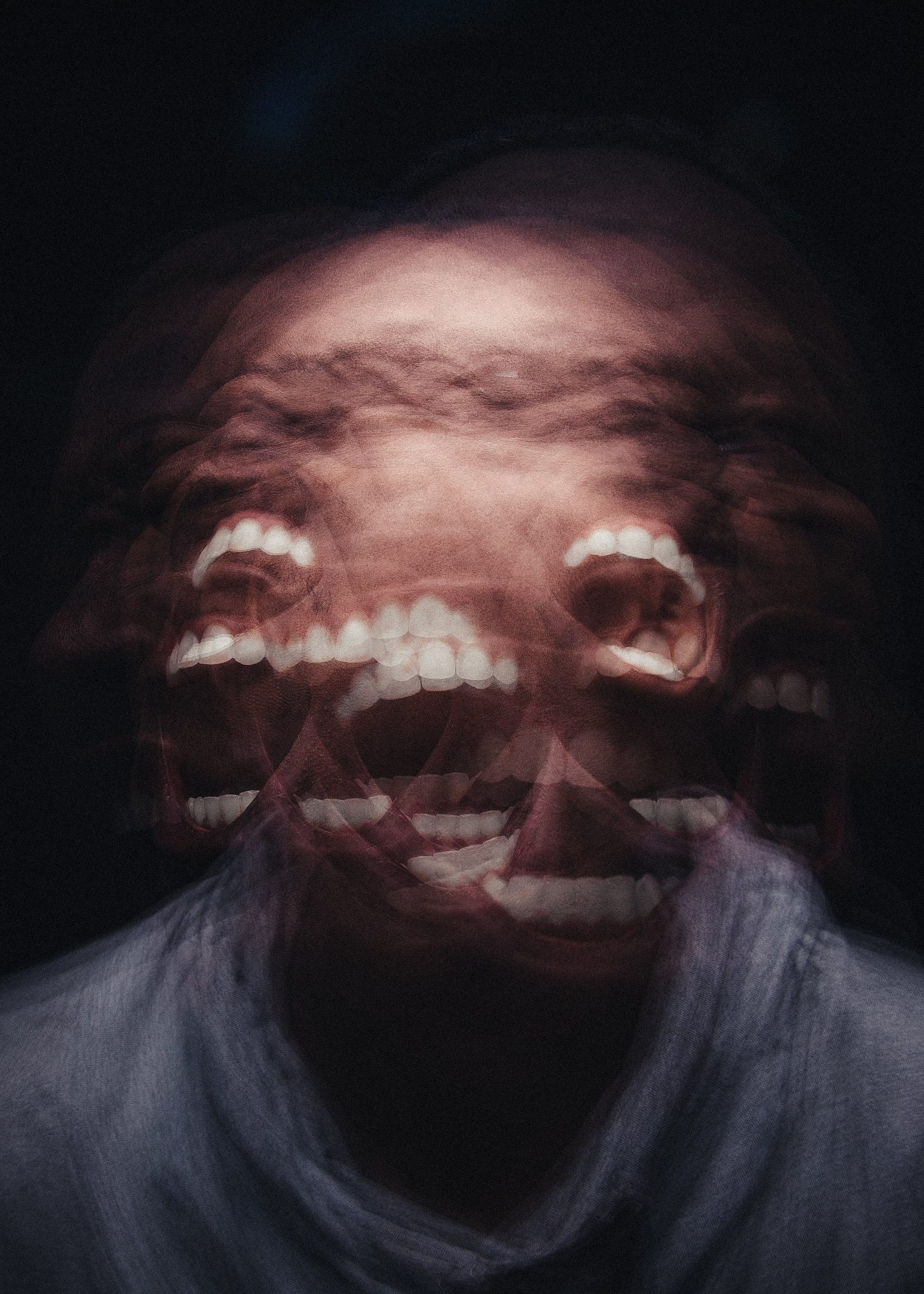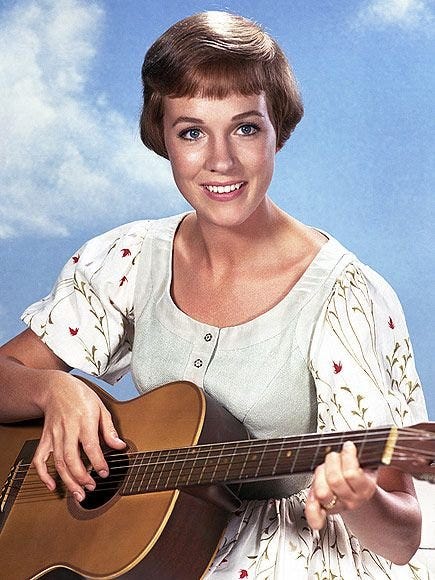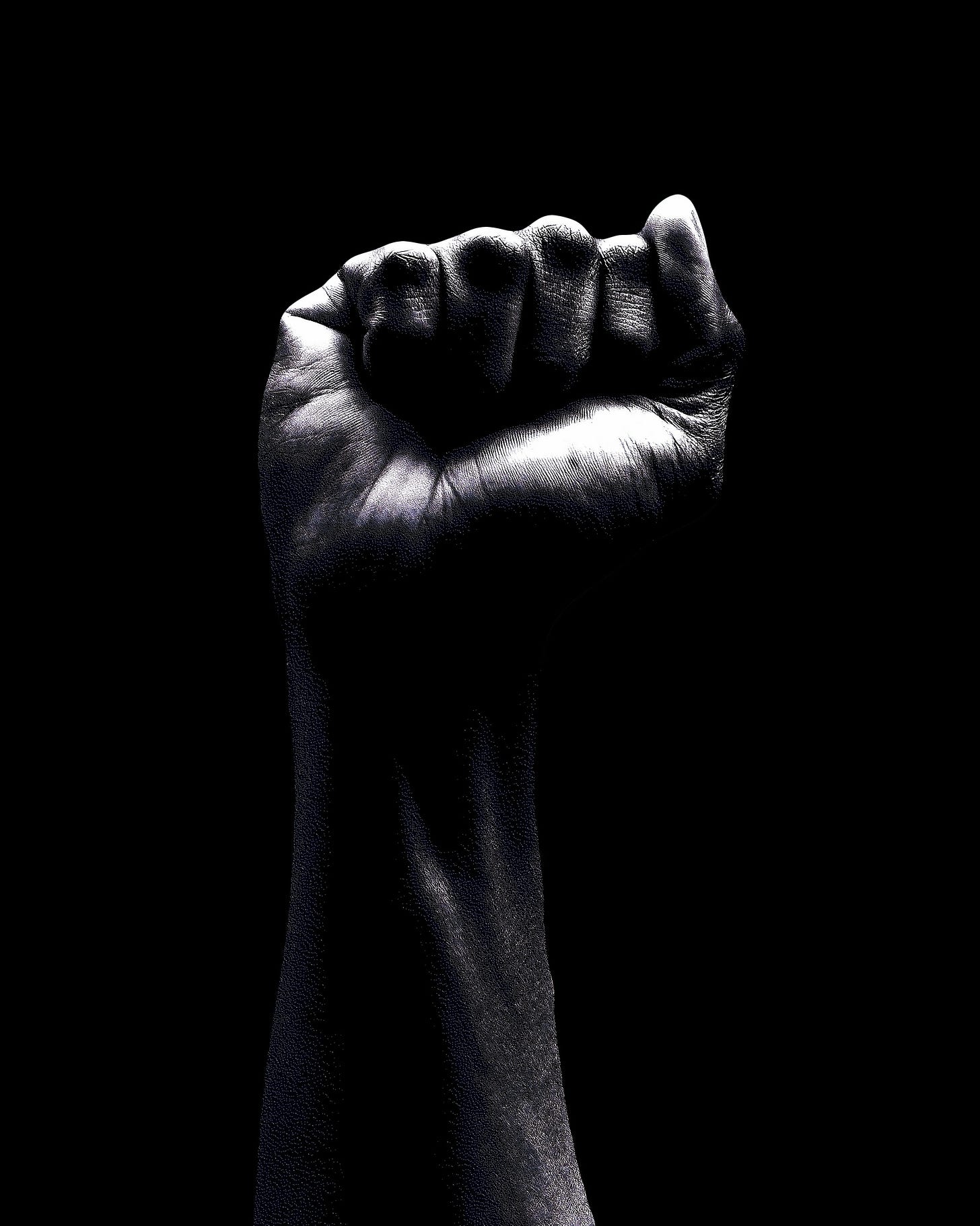The Courage to Scream
If you were your most authentic self, would you need a moment to scream your head off? Written in honor of Mother's Day in 2023, I celebrate one hell of a moment with one hell of a woman...
I was surprised at how much my mother’s voice reverberated against the walls of my car while she yelled. I won’t say her scream was like that of a horror movie, because that implies fear on her part, of which there was clearly none; but, I will say that her voice was so loud and true that it cracked and quivered as one’s speech does when it reaches the apex of authenticity. As my mother’s sole audience, the scream was blood-curdling only to me. I felt fear. And awe, but way more than that too, because the scream also insisted on transformative participation. Like a tornado, my mother’s screaming sucked me in, disrobed me, and dislodged some old insincerity before spitting me back out. Wisdom transmissions are sometimes like this: that is, unpleasant and uncomfortable as all hell. I had received countless of them from my mother throughout my life, but they were always softer. This was like a lioness roaring at her cub to reveal the nature of the roar itself, without any care to comfort. It has remained a deeply impactful moment in my life and made me doubtless that my mother had awoken the soul-center of her being during the last months of her life, however unstable the realization was.
We were making the 15-minute drive back to Arlington, Virginia from American University in D.C. where I attended law school. I had invited my mother to my Health Law class, with special permission from the professor, because there was a guest speaker in attendance that evening who was tackling the topic of how our U.S. healthcare system compared to those of other nations, a topic near and dear to my mother’s heart. A French-American woman with more-than-a-penchant towards social justice, and a fiery advocate of universal healthcare and single-payer systems, my mother saw our current healthcare system as an immoral insult to the poor; as evidence of America’s deference to corporate greed; and as sheer hegemonic arrogance when so many better-functioning models were apparent. She was right. And she knew her stuff.
We walked into the lecture hall and I led her about four rows back to where I usually sat. I opened my laptop, as usual, to take notes, and she opened her purse to pull out a pad of paper and pen. We chit-chatted during the few moments before class, though I can’t remember what about. It didn’t matter. I loved talking to my mother about everything and anything, and it would be hard to say there was a person on the planet I looked up to more. She was intelligent and cared about the world and others, almost to a fault. Her Catholicism was somewhat baffling in the sense that my mom disagreed with pretty much every Catholic party-line in the political sense, being far more progressive than her stated religion. And yet, she attended church every Sunday. My sense was that she deeply resonated with foundational values like compassion, tolerance, justice, and love, particularly for the most oppressed among us, and that she found a narrative for these values in the Christian tradition she inherited. These values were what she loved to talk about; what she stood for at countless dinner-party debates; and what she embodied through her own conduct, including her consistent attendance at rallies and marches that favored gun-control, abortion rights, reparations, social programs for low-income families, immigrant rights, racial justice, universal healthcare, and any challenge to the “one-percent.” (And these are just the marches and rallies I can remember attending with her!) Church provided a spiritual element to these deeply held values, but you got the sense from my mom that their earthly embodiment was what mattered most, even to the point of compassion fatigue.
I’ll say this: you wouldn’t want to oppose my mother in a debate. She was a formidable reader, and her persuasiveness lied in her ability contextualize facts and figures within a compelling moral argument that was somehow so heartfelt, you’d feel touched even as you felt annoyed at how friggin’ armed she was with concrete evidence. She didn’t get petty or personal, but was instead enviably sincere in her solidarity with those who suffered and rhetorically equipped to stand beside them. And, she wouldn’t give up trying to convince you. Worst of all, when it was over, she wasn’t sore like you were and would be all too ready to hug you, turn on some funk music, and ask you to dance with her. Plus, there was usually no chance for her to be sore. She was often right and knew when you were just scrambling to keep face. It’s honestly no wonder I was drawn to the law as someone who longed to emulate her intellect as well as her heart. I’m still working on the dance moves.

And so, it was with a strange combination of reverence and pride that I invited my mother to be part of my law school world that day. I probably wanted her to see the rigor I was part of, and also loved knowing she was fully equipped to present the evening lecture herself. But, Maman wasn’t much into public speaking. She often projected authority outwards, claiming little for herself, all the while embodying it in a way that was apparent to everyone except her. I wouldn’t necessarily call her shy, but definitely naturally humble in some way I admired. True, she was extroverted and loved fun and animation, but never needed to be the center of attention, even holding herself back sometimes in deference to other’s judgments or preferences. That’s part of what made the evening’s events so badass. Maman broke through some kind of artificial sense of being demure, something I had seen many times before, but not to this extent.
I can’t say I remember all the details of what took place during that lecture. I do, however, remember cringing with anxious embarrassment during most of it. Looking back, the only thing embarrassing was the fact that I was embarrassed. At the time, I wasn’t very attuned to wilder sides of the feminine principle within myself, and therefore unable to accommodate it fully in others. In many ways, this evening was my initiation. The whole thing started off hilariously wrong. You know when you bring someone to see a movie that turns out to be, not only horrible, but also horrible in the particular ways the friend you brought would hate? And the whole time you sit next to them feeling their fumes of dissatisfaction? Yeah, it was like that.
The lecturer was clearly very knowledgeable, but kept emphasizing her “neutrality” on the subject and seemed to intentionally avoid any conclusive statement about the dysfunction of our healthcare system, even while the information she presented implied precisely that. If there’s one thing my mom didn’t like, it was when people were being “wishy washy” (as she said it.) She adored boldness in others, no doubt because it peripherally and partially satisfied her own longing to be fully herself. She liked when people “got in the game” and articulated an opinion, even if it was temporary or changed over time. Anything else was “Julie Andrews,” an actress my mother notoriously (and hilariously) disliked out of some detest for her overly proper movie characters and “nasal voice” which, to my mother, was intolerable to listen to and therefore unable to communicate anything of value. You wouldn’t see my mom hanging out with a Julie Andrews in a bar. You’d see her with a person who laughed a little-too-loudly, who drew stares and didn’t care. She’d be with the odd-balls and happy as a clam. And so, when it became clear that the guest lecturer in my Health Law class was a Julie Andrews, my cringing began, knowing that I might as well have brought my mother to see the Sound of Music.
About fifteen minutes into the presentation, my mother raised her hand and pointed out inaccurate discrepancies in two graphs the lecturer had displayed, as well as obvious (mathematical) errors in the totals. Fair enough. The lecturer paused, reviewed her slide in silence for a moment, and graciously conceded. Not long after that, Maman raised her hand again, but this time started speaking before she was called on, as if the raised hand was more of an announcement than a request. She asked the lecturer her basis for making a passing statement (I believe the presenter had said something about the “irrationality” of price controls for prescription drugs, which, to my mother’s credit, was pretty dumb.) Maman’s question wasn’t caustic in content, but she was unapologetically direct, and you could see a few students shift in their seats. I can’t remember how the lecturer responded, but the exchange spurred a debate in the class. It was then that a repeatedly-arrogant, boat-shoes-wearin’, tie-sportin’, prep-from-an-80s-movie-resemblin’ classmate (who looked at lot like this guy below) said, “Come on people, we all know the United States has the best economic system in the world and best healthcare system in the world, its insane to think…” And that’s about all he got out before Maman jumped in.
The details of the diatribe that Maman interrupted with have escaped me, but I do remember that it started with her mockingly chuckling while stating, “The only thing insane is what you just said and I’m afraid, my dear, you have no idea what you’re talking about.” (Me internally: “oh shit.” Cringing resumes full-throttle.) Maman backed up her claims though, with intense precision and detail I might add, and it was one of those moments when I didn’t know whether to plead with her to stop or applaud her. I was half expecting her to pull out a sword and quickly cut a “Z” for Zorro in the guy’s collared shirt when my law professor interrupted and said, “Excuse me, we will not be speaking to each other like that here.” She urged silence and a return to the guest lecturer’s presentation. My mom shrugged with no sign of shame, as if it had just been revealed that the professor was none other than Julie Andrews herself. In an almost uncharacteristically relaxed and cool way, she leaned back in her chair and sarcastically said, “Oh I’m sorry, I assumed this was a place that encouraged scholarly debate and had an interest in teaching students fact from fiction.” Daaaamn. Zorro strikes again.
About a year before all this happened, my mother had fallen into a deep depression that seemed to come out of “nowhere.” Those of us in her orbit experienced her as an exuberant and cheerful lady, a wonderful mother, an active community member, a friend to so many, an advocate, and a blast to be with. But, of course, the depression didn’t come out of nowhere, and time yields more insight, understanding, and compassion than could ever be conveyed here. I will say that during the two-and-a-half year span of my mother’s acute (observable) depression, there were two or three periods of a few months where it seemed to vanish entirely. It its tracks, you could tell Maman had discovered newfound confidence, wisdom, and yes, perhaps a little mania from time to time. During the late fall of 2011 when I brought my mother to my law school class, we were in one of these periods when the clouds broke up and the sun shined through. The depression would return again before she died about a year later, but not without revealing that Maman had indeed courageously descended, met the truth-telling-dark-goddess of the unconscious face-to-face, and returned with many lessons that needed to be learned. Whether this journey was fully recognized, honored, supported, normalized and assimilated due to the causes and conditions beyond her, is perhaps a story for another time. But in this story, because of what happened next during our drive home from a terribly-awkward-and-yet-strangely-awesome-health-law-class, I now know she did dive to her depths despite life’s oceanic turbulence; did reach for (and grab!) as many parts of her previously-excluded self as she could from the dark sea floor; and did resurface with the power and inertia of a current unknown to all of us, doing her best to reorganize herself, now with more wholeness, while also doing her utmost to catch her breath.
We were pulling out of the law school parking lot under the night-time sky when I said something. Something gentle, but (now that I look back on it) something stupid. I had been mortified during class. I was still thinking like high-schooler: wanting to be liked more than wanting to be real with myself. My mother had matured far beyond that now. She had realized that she no longer wanted to sacrifice so much of herself for the sake of other’s expectations or limitations. But this insight came with fire. Like a supernova that had not yet settled into a steady-state, my mother’s new knowing was bright and blazing, but also hot and unstable. Most importantly, however, it was real. So, when I said something like, “you could have been more polite and you put me in an awkward position…” KA-BOOM, something unleashed…
It started with yelling that built up to a scream. It’s hard for me to communicate how aware I was that I was not being “yelled at” but rather implicated by what she was booming, all the while being supremely affected by the vibrational power of the fantastic explosion. Maman yelled (and I mean yelled) about being fed up with holding people’s delusions with white gloves; about how many people will passively insist on staying “asleep” until they are forced to wake up; about her total unwillingness to shy away from truth for those who ignore it at the expense of others; about her refusal to any longer hide any part of herself; about the brutality of passivity and “niceness” by any so-called-authority, like my professor, who wielded power to distract us from the conflict needed for justice; and about her total rage for even the implication that she should feel ashamed of herself. Then, the yelling escalated to a scream that seemed to come up from her toes, through her whole body, and out into the cosmos. At the top of her lungs, as if on the edge of battle, in a way that shook my marrow, the car, and the future, she repeated one word:
“COURAGE!!!”
“COURAGE!!!”
“COURAGE!!!”
Her fist shoots up with every mention of the word.
“COURAGE!!!”
I begin to cry.
“COURAGE!!!”
My hands start shaking while holding the wheel.
“COURAGE!!!”
This woman is crazed!
“COURAGE!!!”
I’m afraid…
“COURAGE!!!”
This is not a story about diplomacy or skillful means. It’s not even a story about love or connection. Instead, this is a story about the raw power of authenticity, however imperfect, that cannot bear to be anything other than what it is. It is a story about healing the split with our unconscious, and trusting that it’s worth reclaiming lost parts of ourselves, even if it makes us messy, shaky, and pissed. Because at least it’s real.
There is some horrific poetry, not only to how this evening foreshadowed my own journey to the depths and back, but also that it provided the instructions for how to do it. I now know that when we go through something difficult — through hell, even — and we barely make it back alive, it can become an intolerable violence to subsequently deny any part of our experience, most especially the truth of our pain and deepest knowing. To stand in unequivocal solidarity with what is real for us, however that may shift over time, takes COURAGE, because it usually demands being inconveniently, and sometimes excruciatingly incongruous with collective standards of how we and others expect ourselves to be. It’s as if the psyche knows this, and equips us with an energy we never knew possible, and so yeah, insight from our depths can come out explosive at first. Feminist Jungian psychologist Sylvia Brinton Perera discusses this through the myth of Inanna, the above-ground goddess (our conscious minds), who descends to meet her “sister,” Ereshkigal, ruler of the underworld (our unconscious minds). She explains that when Inanna returns
“…she comes up loathsome and claiming her right to survive. She is not a beautiful maid, a daughter of the patriarchy, but ugly, selfish, ruthless, willing to be very negative, willing not to care. We know this as the demonic return of the repressed shadow. Although it stands ultimately for life, it often erupts in birth and takes a lot of taming. It may be a ‘rough beast,’ or it may, indeed, merely feel fearsome when a woman comes out of hiding to stand her ground — to herself and/or those around her. We see this demonic form of the returning goddess in much of the early women’s liberation fury. For the most part that stage in the movement has passed, but each individual woman initiate may have to go through it.”
Maman went through it, and had the courage to bellow that she would not go back “into hiding.” It can be hard to accept that authentically living may require a rocky, turbulent take-off for some, yet if the psychic engines need to scream to soar, so be it. I recall that a couple months after my mother died, my then-husband brought me to a party. I was in my depths and found it intolerable to pretend. While people were talking about their cheerful likes and dislikes, about skiing in Tahoe versus Europe, I’ll admit it: I got angry drunk and, at one point, interrupted the banality of it all, screaming above the music,“Next topic! So uh…what do ya’ll think happens when you die?”
I’m not one of those people who believe that the ultimate goal of a healthy psyche is individuation above all else. From my limited, library-card-knowledge on the subject, I know there is a lot of complex debate with regards to what makes a person psychically well, including not only authentic individuation, but also, for example, the ability to foster meaningful connection with others. But, I will say that authenticity with one’s totality — not just the parts of us we like, but all of it — seems to be a critical component to feeling well, and to being at ease with ourselves for the long haul.
Given this is a continual, life-long process, it can be helpful to know how untidy it can all get. For many of us, at least initially, the embrace of what’s authentic can’t be contained within our internal awareness alone. The suffering that brought us in conscious contact with the previously unconscious was too great and happened so fast, we’re forced to see the previously excluded sides of ourselves all at once. Like thrusting a sleeping person into a mess hall with blazing lights, it takes a minute to adjust. In the meantime, our raw newfound wholeness seeps out in our speech, in our facial expressions, in our ruthless resentment for having ever been put in the position to deny ourselves in the first place. Overtime things may settle, but initially, we’re so fed-up with being masked, sometimes to the point of rage, that it comes out a little rough around the edges. But if that’s the trajectory to authenticity for you, so be it. It was for me. It was for Maman. Not perfect, just whole.
The ability “scream” who we are — that is, to be who we are authentically and unapologetically — takes tremendous courage. My own experience is that, relationships with people who loved your persona more than your totality, will fall apart. People will look at you funny at parties, unconsciously resent you for breaking implicit social rules, and even talk badly about you. But, at least you won’t be “wishy, washy” about whats real for you. And sooner or later, you’ll find some odd-balls at the bar, who will love your authenticity to the moon and back, because it gives them permission to be themselves, to laugh a-little-too hard too.
The next few years following that evening in the car were the hardest of my life. I discovered, no doubt like Maman did, that you don’t decide to “go to your depths,” to the scary places of the psyche, life just takes you there. The only choice is how you receive the subterranean pull. “COURAGE!!!” she screamed, again and again and again, as if to make sure I understood. I still hear it. I still feel it. The word has reverberated in my heart ever since, during countless spins around life’s Great Round, the ups and downs, imploring me to let it all in. And so, if ever a mother gave her daughter something essential to survive, it was when Maman screamed her head off in the car, on the way home from seeing Julie Andrews.











